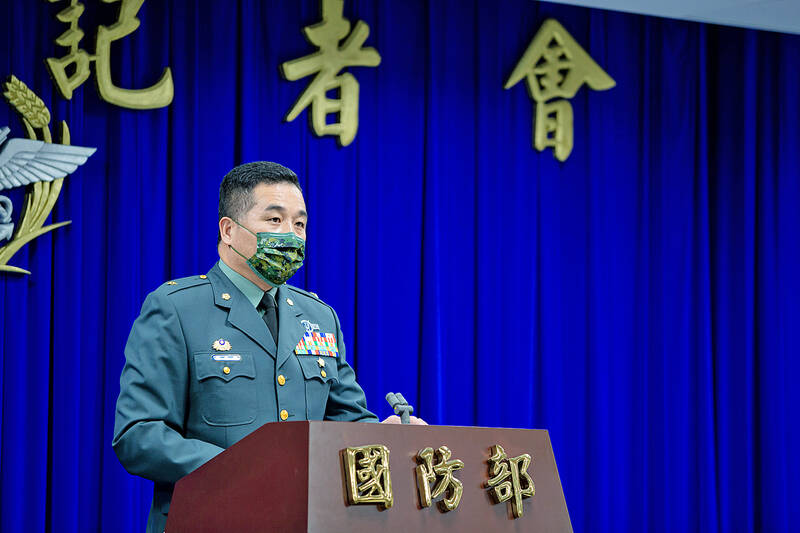Reservists would soon be allowed to voluntarily enroll in dual-track reservist training, which would also be open to female reservists, the Ministry of National Defense said yesterday.
The voluntary program, to be launched in the second quarter, would be the first time that the military has included discharged female military personnel in its reservist training program.
The military runs a dual-track reservist training program that began last year with a comparatively small number of reservists undergoing two weeks of intensive training twice in eight years, while the majority undergo a five-to-seven-day regimen four times in eight years.

Photo courtesy of the Ministry of National Defense
Volunteer reservists in the new program would be able to choose one or two-week training.
For the current training, only male reservists are required to join, with participation decided by a lottery.
Major General Yu Wen-cheng (俞文鎮), a division head of the ministry’s All-Out Defense Mobilization Agency, told a news conference that the new voluntary training would be open to about 500 male reservists and about 200 females.
To encourage reservists who have already completed the required maximum four stints of mandatory training in eight years to join the new voluntary program, the military would give a NT$5,000 one-time bonus to each person who joins the program for a fifth round of training, Yu said.
Those who want to join the voluntary program can log on to the All-Out Defense Mobilization Agency’s Web site to sign up or visit a reserve command or reservist service center, he said.
Previously, the military said it only trained male reservists because it did not have sufficient training capacity to accommodate men and women.
While men are required to take part in compulsory military conscription and reservist training, women can join the armed forces voluntarily to serve as soldiers or officers.
As of 2021, 8,915 women were listed as reservists. Among Taiwan’s 180,000 active military personnel, 15 percent are women, military data showed.
The ministry also gave more details on its planned acquisition of anti-tank munitions, following fears that a proposed purchase of Volcano mine-dispensing systems from the US would litter Taiwan with landmines.
The army would only lay mines on potential landing sites, Army Chief of Staff Chang Yuan-hsun (章元勳) told reporters.
The Volcano system — vehicle-launched anti-tank munition-laying systems and M977A4 HEMTT 10-tonne trucks — were part of a US$180 million package approved by the US Department of State on Dec. 28.
The mines are “smart” and have a digital timer for self-destruction, mitigating worries that they would affect noncombatants, Chang said, adding that the mines are not buried, making them easier to spot.
This would make mine removal after combat much easier and worries about collateral damage — as there has been with older mines buried in Kinmen County — are unnecessary.
The mines would not be deployed “half a year” before an invasion, instead waiting until a landing attack has been confirmed, he said.
The army would be fully responsible for the mine-laying system and would endeavor to minimize the potential of accidental injuries, he added.
Additional reporting by Aaron Tu

INVESTIGATION: The case is the latest instance of a DPP figure being implicated in an espionage network accused of allegedly leaking information to Chinese intelligence Democratic Progressive Party (DPP) member Ho Jen-chieh (何仁傑) was detained and held incommunicado yesterday on suspicion of spying for China during his tenure as assistant to then-minister of foreign affairs Joseph Wu (吳釗燮). The Taipei District Prosecutors’ Office said Ho was implicated during its investigation into alleged spying activities by former Presidential Office consultant Wu Shang-yu (吳尚雨). Prosecutors said there is reason to believe Ho breached the National Security Act (國家安全法) by leaking classified Ministry of Foreign Affairs information to Chinese intelligence. Following interrogation, prosecutors petitioned the Taipei District Court to detain Ho, citing concerns over potential collusion or tampering of evidence. The

‘FORM OF PROTEST’: The German Institute Taipei said it was ‘shocked’ to see Nazi symbolism used in connection with political aims as it condemned the incident Sung Chien-liang (宋建樑), who led efforts to recall Democratic Progressive Party (DPP) Legislator Lee Kun-cheng (李坤城), was released on bail of NT$80,000 yesterday amid an outcry over a Nazi armband he wore to questioning the night before. Sung arrived at the New Taipei City District Prosecutors’ Office for questioning in a recall petition forgery case on Tuesday night wearing a red armband bearing a swastika, carrying a copy of Adolf Hitler’s Mein Kampf and giving a Nazi salute. Sung left the building at 1:15am without the armband and apparently covering the book with a coat. This is a serious international scandal and Chinese

Seventy percent of middle and elementary schools now conduct English classes entirely in English, the Ministry of Education said, as it encourages schools nationwide to adopt this practice Minister of Education (MOE) Cheng Ying-yao (鄭英耀) is scheduled to present a report on the government’s bilingual education policy to the Legislative Yuan’s Education and Culture Committee today. The report would outline strategies aimed at expanding access to education, reducing regional disparities and improving talent cultivation. Implementation of bilingual education policies has varied across local governments, occasionally drawing public criticism. For example, some schools have required teachers of non-English subjects to pass English proficiency

TRADE: The premier pledged safeguards on ‘Made in Taiwan’ labeling, anti-dumping measures and stricter export controls to strengthen its position in trade talks Products labeled “made in Taiwan” must be genuinely made in Taiwan, Premier Cho Jung-tai (卓榮泰) said yesterday, vowing to enforce strict safeguards against “origin laundering” and initiate anti-dumping investigations to prevent China dumping its products in Taiwan. Cho made the remarks in a discussion session with representatives from industries in Kaohsiung. In response to the US government’s recent announcement of “reciprocal” tariffs on its trading partners, President William Lai (賴清德) and Cho last week began a series of consultations with industry leaders nationwide to gather feedback and address concerns. Taiwanese and US officials held a videoconference on Friday evening to discuss the